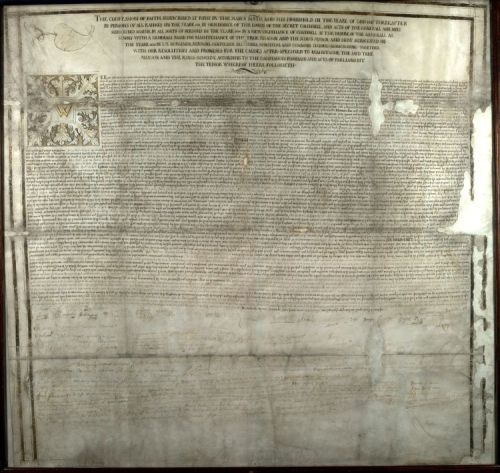When the Scots became God’s chosen people,The 17th century was certainly a period of religious
When the Scots became God’s chosen people,The 17th century was certainly a period of religious turmoil in Europe. In Britain this was certainly true as Catholics, Anglicans, and Puritans vied for the soul of the kingdom. At the time King Charles I of Englad, a staunch Anglican, believed that his religion was the only true religion, and only religion to be worshiped in the British Isles. He tried to force his entire realm to worship as he did by imposing a common national prayer book. You could be Catholic or Puritan, or any form of Christianity you want, so long as you only say the prayers, and conduct rituals that are approved by the Church of England. In 1673 the prayer books were distributed to England, Wales, Ireland, and Scotland.In Scotland the prayer book had a riling effect on the hot-blooded Scots. The Scottish Presbyterians liked their worship to be simple and humble, not elaborate and ceremonial like Anglicanism. To the Scots, the new prayer book wreaked of Papism and English dominance. The Scots were not happy. When the prayer books were introduced in 1637, Scotland was incensed. In Edinburgh the bishop was run out of town by an angry mob who pelted him with rocks, animal dung, and prayer books. In Brechin the bishop conducted his service with two loaded pistols at the podium.In response to the action of King Charles I the Scots renounced Charles I as a religious leader. In 1638 the Scottish Parliament, Presbyterian Church, a number of nobles, and thousands of regular Scottish citizens signed the National Covenant of 1638. The Covenant was a formal agreement and direct contract with God himself. This Covenant stated that the Scots owed no allegiance to any earthly king, but answered to a higher power; King Jesus. It also rejected Catholicism and all forms of Catholic worship. Unlike other great documents which are signed by nobles, elite citizens, and representatives of the people, the National Covenant was open to signing by people of all classes. Copies traveled all over the country for signature, and literally thousands of Scots signed. Some who refused to sign were forced into exile. After the signing of the National Covenant, supporters became known as Covenanters. The Covenanters truly believed that they had made a holy covenant with God just as the Israelites had done in the Old Testament. Furthermore, like the Israelites, the Covenanters believed that they were God’s chosen people, and that Scotland was God’s holy kingdom. The Covenanters only had one problem, while Jesus was a great leader in Heaven, he was conspicuously absent on Earth. The Coventanters needed an earthly leader, albeit a king with greatly reduced powers and authority. Furthermore, the ambitious Covenanters not only wanted to enforce their religion on Scotland, but also wanted to enforce it in England. To solve this problem they made a treaty with Charles I, who had recently been overthrown by the English Parliament. The agreement stated that Scotland would invade England and restore Charles to the throne if he enforced a three year trial period of Presbyterianism in England. Charles I reluctantly agreed, and a Scottish Army invaded shortly thereafter. Unfortunately for Charles and the Covenanters, the Scots were crushed by the English general Oliver Cromwell and his New Model Army. Charles I was executed a short time later, and the Scottish Lowlands were occupied by England.After the blow dealt by Cromwell, the Covenanters reached out to Charles I’s son, Charles II, who was living in exile. They made an agreement that Charles II could become King of Scotland, with strictly limited powers, if he signed the Covenant. In 1650 Charles II agreed and signed the Covenant, but only for political reasons. However in 1658 Oliver Cromwell died, and his Parliamentarian government died with him. Charles II was restored to the English throne, and immediately declared his pact with the Covenanters to be null and void. Furthermore he declared the National Covenant to be unlawful. After restoring English control over Scotland and the Presbyterian Church, Charles II had all high officials who refused to renounce the Covenant executed. After the fall of the Covenant, the Covenanters held illegal open air worship services and meetings. On a few occasions they incited rebellions, but none were successful. Finally after internal infighting and further persecution by the English, the Covenanter movement dissolved entirely.Read the National Covenant for yourself here -- source link
Tumblr Blog : peashooter85.tumblr.com
#history#scotland#religion#presbyterians#covenanters#scottish history

